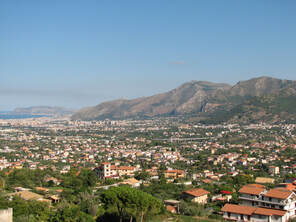 we are rooted as one we are rooted as one Studying our family history is a pursuit which can offer many insights, hopefully helping us to see our ancestors as real people rather than viewing them as a gene pool from which we have emerged. While the events of our ancestors’ lives and their personalities will remain mostly unknown, they are part of our history and we are connected to them. Recently I asked the help of a friend who is quite adept at genealogy work if he would investigate some of my family tree. Delighted at what he found, it subsequently inspired reflection upon the genealogy of Jesus presented in the Gospels. Just as with our families of origin, the list of Jesus' ancestors is important, perhaps more than many may realize. It reveals a tremendous amount about God’s plan of salvation, a continually unfolding plan that includes each of us. It suggests that all along God intended our inclusion in the Body of Christ, that our lives are affected by those who came before, and that we, too, will affect the lives that come after us. In short, we are rooted as one in and through Jesus: we are connected, and we all belong. 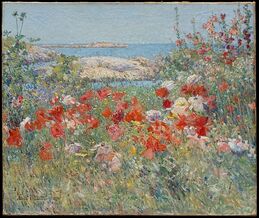 a message of hope a message of hope When reading the Gospels, it is tempting to skip past the genealogy of Jesus to get to the 'more relevant stuff,’ but I must insist: this is the ‘relevant stuff.’ The Gospel writers were intentional in recording only that which was essential to understanding Jesus and His teaching. There is nothing superfluous or without revelatory meaning in any part of Scripture: every word is important. Therefore, we should pay attention to the genealogy as much as any other part of the gospel. If we look to Matthew we will see that beginning with Abraham, he divided the list of Jesus’ ancestors into groups of 14 generations, not to give an exact, exhaustive list, but to symbolically express that God had a plan from the beginning for His Son to enter the world, and that Jesus is the fulfillment of those promises.* Matthew, a Jewish convert writing for a community of Jewish converts, knew that his readers would understand that message, which was not only about their past and present, but was also a message of hope for the future: God’s plan includes future generations who factor into the continuation of that which was laid out from the beginning. Thus, no matter what it seems like, no matter how dire things appear, God has a plan of which we are part that will end with victory and joy. And in this plan, “even the hairs of your head are counted.” (Matthew 10:30) 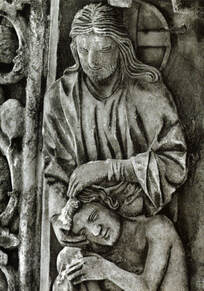 connecting Jesus to Adam... hence to God connecting Jesus to Adam... hence to God Luke’s genealogy contains some different names than we find in Matthew. And while Matthew emphasized Jesus’ connection to Abraham, Luke went further, connecting Jesus all the way back to Adam, from whom we all descend. Luke, a Greek convert writing for a community of Greek converts, knew that Abraham and covenants would not be familiar to his readers. Therefore, in the first two chapters of his Gospel, Luke showed that Jesus was fully man, eloquently writing of His mother Mary, thereby informing the Greeks that Jesus shared in their humanity and was approachable. He also announced that Jesus was God’s own Son, revealed by the angel’s proclamation to Mary. After the birth narratives Luke continued to explain the divinity of Jesus by highlighting His authority: the genealogy is written in reverse order, connecting Jesus back to Adam, and hence to God, the Father. This authority is the source of the power with which Jesus taught, healed, and worked miracles. In short, Luke emphasized that Jesus was fully God and fully man, but he also made it clear that God’s plan included all people: men, women, Gentile, Jew, poor, outcast, sinner, etc.** 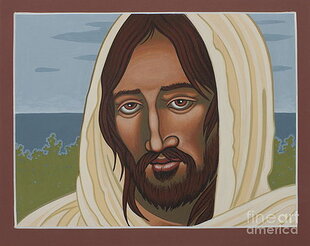 God never takes His eyes off us God never takes His eyes off us Our takeaway from the genealogy of Jesus is first, that we take to heart that we are no less a part of this grand plan than Jesus was. If God has every hair of our heads counted, He certainly does more than just notice us: He loves us! It is also important that we never forget the fact that we are connected to God. We should always be conscious that God never takes His eyes off us, and would delight in it if we never took our eyes off Him. Second, our spiritual connection is far more important than that of the flesh, and inspired by the genealogies in the Gospels, we can and should reflect upon our inherited legacy from Jesus which flowed through the first Christians and all of the saints whose lives and message are part of our spiritual DNA. We should ask ourselves what we would like our contribution to be as part of this line of witnesses (paraphrase of Hebrews 12:1) and then pray for the grace to live it. 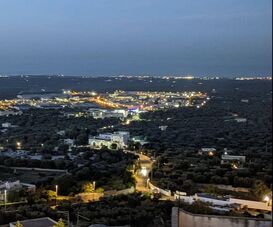 as we are welcomed, we should welcome everyone as we are welcomed, we should welcome everyone Finally, we should apply what Jesus and the revelation of His genealogy taught: as we are welcomed, we are to welcome everyone, offering love, mercy, kindness, and generosity. In this, our lives have incredible meaning and purpose. From the lowliest and humblest to the greatest and most notable, all have a part to play in building the Kingdom. We are called to use whatever gifts we have been given to evangelize, serve one another, and grow in holiness. And lest we think we cannot do this, we can, because all of us are capable of love. We are connected to our earthly family through a line of ancestors, yes, but it is the spiritual connection with Jesus that is the source of all gifts, and through Him we have our truest family. 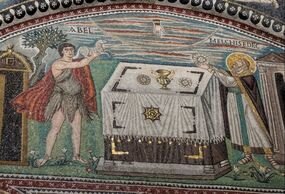 our connection to one another our connection to one another May we recognize the importance of our connection to one another as members of the Body of Christ! May we be filled with gratitude at the gift of being part of one family! And may we respond to our brothers and sisters, guiding and welcoming them into our Christian family! Let us meet in the Heart of Jesus! Peace! ©Michele L. Catanese 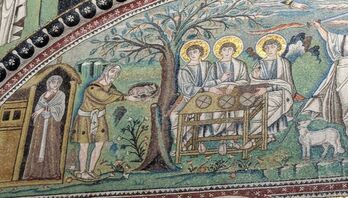 intended from all eternity intended from all eternity * The Jewish culture was steeped in the symbolism of numbers, so the division of the list into 14 generations had symbolic meaning. Seven was the number of perfection, arising from the seven days of creation, seen as perfect since God made everything 'and it was good.’ Hence, this is a reference to completion and perfection. 14 would be ‘double the perfection,’ not that something complete and perfect can actually be doubled, but rather, the exaggeration would alert a Jewish convert who would understand that there was an emphasis on God’s plan being perfect and intended from all eternity. ** Remember, the Greeks feared gods because in their mythologies gods were deities who couldn’t care less about humans and if they got involved, were nothing but trouble. In revealing Jesus as fully man and fully God, Luke was teaching them something contrary to what they believed previously: there is one true God and He cares immensely. This was a foreign thought to them, and therefore, it was a monumental revelation that the true God was merciful, loving, and welcoming to all. NOTE: I am taking a blog holiday for the rest of the month which means that I will skip the next blog in the 'every other Monday' writing/posting schedule I generally keep. This allows me to keep the ideas (and hopefully the writing) fresh. If you would like something to 'tide you over' my suggestion for Monday, July 24 is this entry from 2016. www.catanesesd.com/micheles-blog/learning-to-see-beauty Images: 1. My photo, Punta Secca Beach, Sicily, Italy. My paternal grandmother was from a port town very close to this one. 2. Painting, Celia Thaxter's Garden, Isles of Shoals, Maine, by Childe Hassam (1859-1935) 3. Sculpture, The Creation of Adam, Chartres Cathedral, Chartres, France. 4. Painted image, The Galilean Jesus, by Fr. William Hart McNichols. If you are interested in purchasing a copy you can find it at https://fineartamerica.com/featured/the-galilean-jesus-266-william-hart-mcnichols.html 5. My photo, Ostuni at night, Ostuni, Puglia, Italy. 6. Mosaic, Abel to Melchizedek from Basilica di San Vitale, Ravenna, Italy. Abel is Adam's first born, and Melchizedek was the priest/king who offered the first bread and wine in the book of Genesis when Abram (Abraham) helped them banish their enemies, thus a connection to Adam, Abraham, and a foreshadowing of the Eucharist. 7. Mosaic, Abraham and Sarah offering a meal to the three angels who came from God and who foretold the birth of Isaac. (Sarah is seen on the far side of the mosaic, laughing.) Basilica di San Vitale, Ravenna, Italy. Note: In compliance with GDPR rules, I wish to make it clear that I do not gather any information on any of my readers at any time. |
Heart Speaks to Heart
|

 RSS Feed
RSS Feed

